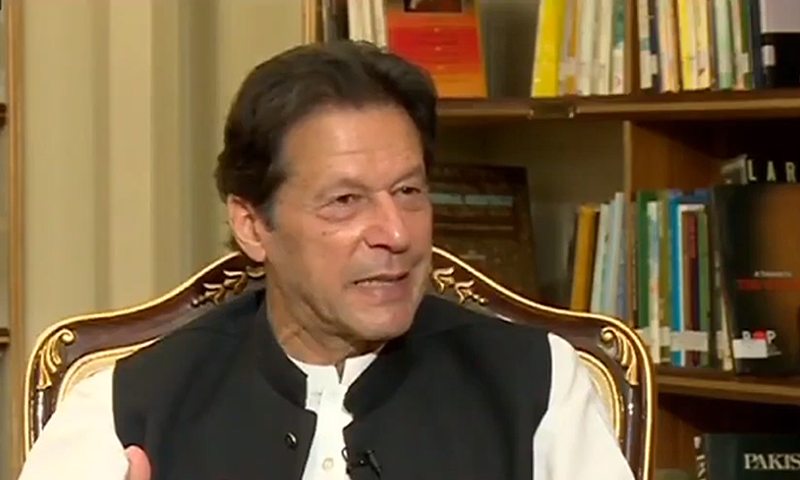Rapists should be publicly hanged or chemically castrated: PM Imran


Prime Minister Imran Khan says rapists should be handed down the most severe punishments to curb rising sexual violence in the country, such as either hanging them publicly or chemically castrating them.
The premier expressed the views during an interview with Moeed Pirzada on 92 News HD broadcast on Monday, in response to a question about the motorway gang-rape case that caused an outpouring of anger across the country and brought sexual violence against women into national focus.
Prime Minister Imran said the motorway rape had "shaken the entire nation" because the victim could have been anyone's sister or daughter.
He said he was "shocked" to find out from police that sex crimes in the country were rising greatly.
"They (rapists) should be given exemplary punishments. In my opinion, they should be hanged at the chowk (piazza)," he said, adding that this punishment should be reserved for rapists and those who abuse children.
Related: Motorway rape case: Why calls for public hangings are part of the problem
"Unfortunately, when we had the discussion, [we were] told it would not be internationally acceptable," he said of public hangings. "They said the GSP-Plus trade status given to us by the European Union will be affected."
He said another option was to "chemically or surgically castrate" rapists, according to the degree of the crime, "as is done by many countries".
Prime Minister Imran noted that the primary suspect in the motorway rape, Abid Ali, was previously involved in a gang-rape in 2013 as well. "We need fresh legislation to permanently sterilise such [criminals]," he said.
The premier regretted that there was no registry of sex offenders in the country, which led to a convicted paedophile from a European country entering Pakistan and sexually abusing children here.
He said sexual crimes should be fought by the entire society, and not just police. "World history tells when you increase fahashi (vulgarity) in the society, two things happen: sex crimes increase and the family system breaks down," he added.
Citing an example, he said the divorce rate in England shot up to 70 per cent at present as vulgarity increased there.
Compared to the West, "our family system is intact. We can fix our justice system and the institutions but if our family system breaks down, we will not be able to rebuild it," the premier stressed, saying New Delhi too has become the "rape capital" of the world due to obscenity in Bollywood.
He said he had pushed for Turkish blockbuster Ertuğrul to be broadcast on Pakistani television because he wanted to prove that Islamic and historical family programmes could be popular in the country too.
Usman Buzdar's 'only weakness'
The prime minister in his answers also defended Punjab Chief Minister Usman Buzdar, who has been the target of increased criticism by the opposition in recent weeks.
Asked whether Buzdar was effectively running the country's largest province, the premier said: "Usman Buzdar has only one weakness ... he is not media-savvy. He can't promote himself on media [and] he does not spend billions of rupees on his own publicity like [PML-N president] Shehbaz Sharif.
"Unfortunately, there are a few people within [the government] who want to become the chief minister and they too undermine [Buzdar]."
The prime minister said Buzdar was not corrupt and was in a difficult position dealing with a "politicised" bureaucracy and police.
Addressing the frequent changes and transfers at the top level in Punjab, Imran said the changes will continue if they help the government provide a better system to the public.
Prime Minister Imran further said those "raising a hue and cry" over the appointment of Lahore Capital City Police Officer Umer Sheikh should ask why there was a need to bring him in the first place.
"In many places, police is hand in glove with the 'qabza group' (land mafia) at the lower level. We are changing [top officials] because people have been trapped by qabza groups," he explained.
He said although former Punjab police chief Shoaib Dastgir had done a "good job", "in the end the prerogative [to replace officials] is of the chief executive."
"The people of Punjab will eventually ask whether police protected their lives and property, not how many [police chiefs] were replaced," he added.
'Opportunity to fix Karachi's woes'
Among other issues discussed during the interview, the prime minister also shed light on the government's efforts to resolve Karachi's municipal and infrastructure issues.
Asked about the wrangling between the federal and Sindh governments over the Rs1.1 trillion package announced for Karachi by him, Imran said: "I am not aware of Sindh government's problems. But I know after the [post-rain] devastation in Karachi, all the stakeholders sat and decided to resolve Karachi's main issues of water supply, waste disposal, sewerage, transport and cleaning nullahs."
"Karachi is Pakistan's engine of growth. When Karachi sneezes, entire Pakistan catches a cold," he added.
He said the recent losses caused by torrential rains in the city had become an "opportunity" to fix its problems, adding that all stakeholders had been given the deadline of three years to complete the tasks that are part of the Karachi Transformation Plan.
In response to a question, he said grievances regarding Karachi's census could be valid, but questioned whether now was the time for a recount of the city's population. The main issue, he added, is how to run cities like Karachi so they generate their own funds and fix their own issues.
The prime minister said Karachi was "non-functional" because the provincial government was elected from rural Sindh and controls the funds, while Karachi has no empowered system of its own.













































